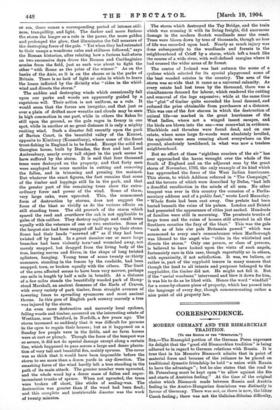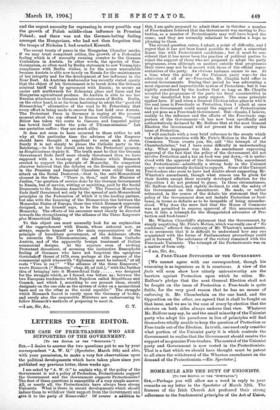MODERN GERMANY AND THE BISMARCKIAN TRADITION.
[To THE EDITOR OP THE SPECTATOE."]
Sur.,—The Russophil portion of the German Press expresses its delight that the "good old Bismarckian tradition" is being adhered to in regard to German relations with Russia. It is true that in his Memoirs Bismarck admits that in point of material force and because of the reliance to be placed on traditional dynastic friendship he held "a union with Russia to have the advantage "; but he also states that the road to St. Petersburg must be kept open "to allow against the fits and starts of Austrian feeling." At the time of the original choice which Bismarck made between Russia and Austria feeling in the Austro-Hungarian dominions was distinctly in favour of Germany. There was not, as there is now, the bitter Czech feeling ; there was not the Galician-Silesian difficulty, and the urgent necessity for repressing. in every possible way the growth of Polish middle-class influence in Prussian Poland; and there was not the German-hating feeling amongst the Hungarians, who had not then forgotten that the troops of Nicholas I. had crushed Kossuth.
The recent treaty of peace in the Hungarian 'Chamber marks, if we may trust competent critics, the growth of a Federalist feeling which is of necessity running counter to the German Centralism in Austria. In other words, the spectre of Pan- Germanism, so often used by Berlin statesmen to cow Vienna into compliance with Berlin wishes, is for the nonce unavailable because Austria is able now to rely on Russia for the maintenance of her integrity and for the development of her influence in the Near East. An Austrian Ambassador has recently stated openly that the object of his Government is to break down the German minimal tariff wall by agreement with Russia; to secure an easier exit northwards for Bohemian glass and linen and for Hungarian agricultural produce. So Austria is able to use her Russian attachment to threaten the statesmen of Berlin. Berlin, on the other hand, is so far from hastening to adopt the good old Bismarckian " alternative of the road to St. Petersburg that every effort is being made to recover the lost hold over Austria. The Protestant Press in Germany is raging at the present moment about the sop offered to Roman Catholicism. "Count Billow has taken the route to Canossa and Imperial policy has bowed itself under the yoke of Ultramontanism.' Let one quotation suffice : they are much alike.
It does not seem to have occurred to these critics to ask why at this particular time the advisers of the Emperor should have thought it expedient to raise such a storm. Surely it is not simply to please the Catholic party in the Reichstag,—to let the Jesuit rats into the Protestant granary, as Simp/icissinius depicts it. The truth must be that the German Government finds itself more closely threatened than we have supposed with a break-up of the Alliance which Bismarck erected to support the principle of Monarchy. No competent observer believed that the debates on the Russian spy question in the Prussian and Imperial Chambers were other than an • attack on the Social Democrat,—that is, the anti-Monarchical element in the State. "There is, then," said the Minister of Justice, "no question of service done by the German Government to Russia, but of service, witting or unwitting, paid by the Social Democrats to the Russian Anarchists." The Prussian Monarchy finds itself threatened not only by the spread of anti-Monarchical principles in the Federation of which it is the leading partner, but also with the loosening of the Bismarckian ties between the Monarchic States of Europe, those ties which Bismarck expressly designed, as he himself says, to be the supports of Prussian Monarchy. The efforts of his successor must clearly be directed towards the strengthening of the alliance of the Three Emperors plus Monarchical Italy.
To this object one must assuredly look for an explanation of the rapprochement with Russia, whose autocrat now, as always, regards himself as the main representative of the principle of hereditary government, of the deliberate efforts to reconcile the Ultramontanists, and with them Catholic Austria, and of the apparently benign treatment of Italian commercial designs. At the expense even of evoking Protestant discontent, of arousing the instinctive Russophobe feeling of Germans who have not forgotten the egregious Gortchakoff threat of 1879, even perhaps at the expense of the commercial spirit wherewith "diplomacy must be imbued," at all costs "Viva le roi !" "The alliance of the three Emperors," wrote Bismarck (" Memoirs," chap. 29, ad init.)," with the further . idea of bringing into it Monarchical Italy was designed for the struggle which, as I feared, was before us; between the two European tendencies which Napoleon called Republican and Cossack, and which I, according to our present ideas, should designate on the one side as the system of order on a monarchical basis and on the other as the social republic." The straggle which Bismarck feared is surely upon the Germany of to-day, and surely also the responsible Ministers are endeavouring to follow Bismarck's methods of preparing to meet it.











































 Previous page
Previous page